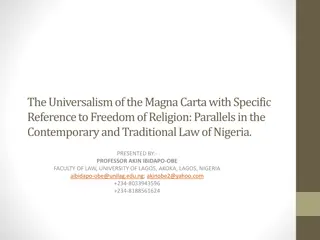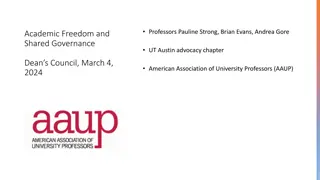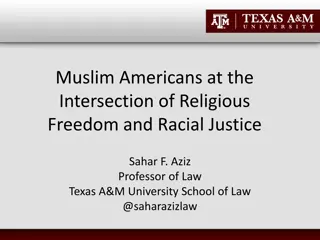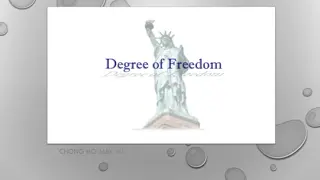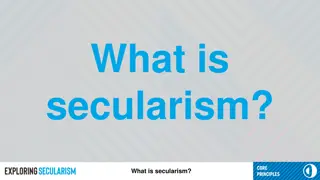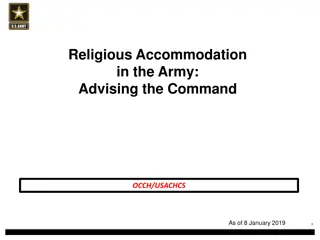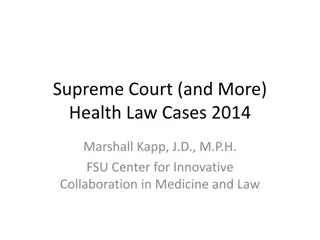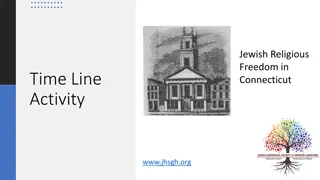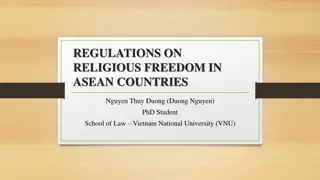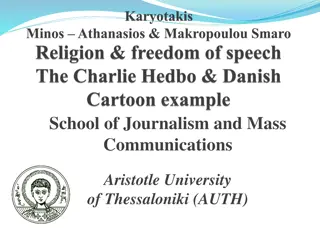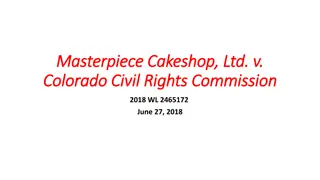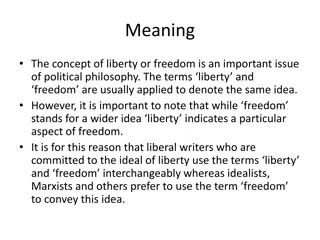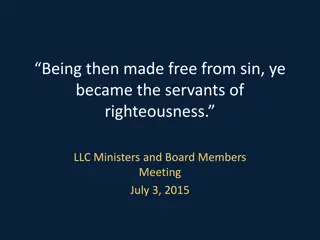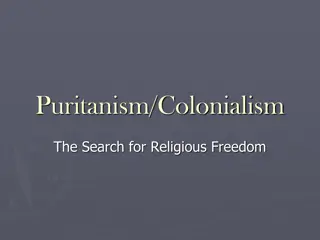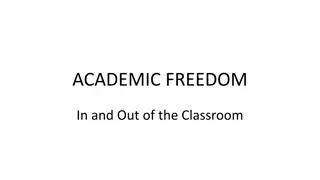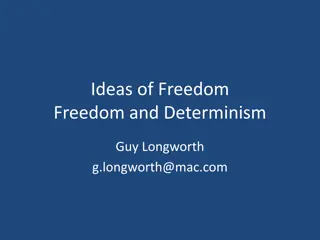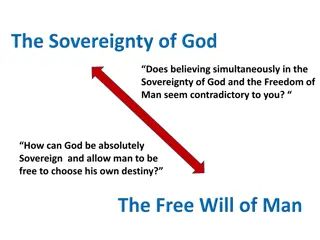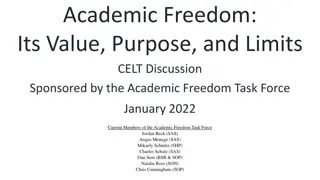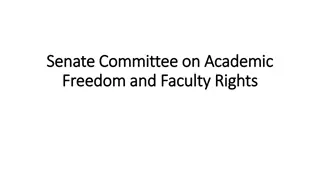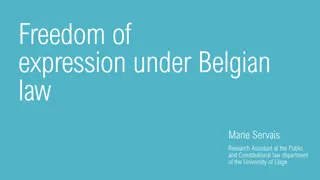Status of Family Laws in India: Hindu vs. Religious Minorities
The family and personal status laws in India vary between Hindu law and those pertaining to religious minorities. While Hindu law has seen extensive reforms, discriminatory provisions still exist. In contrast, laws governing religious minorities have undergone fewer reforms, leading to greater inequ
2 views • 4 slides
The Universalism of Magna Carta: Freedom of Religion in Contemporary Nigerian Law
Magna Carta, a pivotal human rights document, is explored with a focus on its religious underpinnings and its influence on modern legal systems. The parallels and divergences between Magna Carta and Nigerian customary law regarding freedom of religion are examined. The implications of contemporary N
0 views • 16 slides
Advocating Together for Academic Freedom - Importance and Principles
Advocating for academic freedom is crucial for the advancement of knowledge and quality education. The American Association of University Professors (AAUP) champions academic freedom, shared governance, and economic security for faculty members. The 1940 Joint AAUP/AAC&U Statement of Principles on A
4 views • 14 slides
Academic Freedom and Shared Governance Advocacy at UT Austin
Professors Pauline Strong, Brian Evans, and Andrea Gore lead the advocacy chapter at UT Austin, promoting academic freedom and shared governance. The American Association of University Professors (AAUP) plays a vital role in advancing these principles, supporting over 45,000 members. Principles of a
3 views • 12 slides
Panel Discussion on Academic Freedom
Academic freedom is a crucial aspect of higher education, enabling teachers to innovate, explore diverse viewpoints, and facilitate critical thinking. Organizations like AAUP and AAC&U advocate for shared governance and economic security to uphold academic freedom. The 1940 joint statement highlight
4 views • 8 slides
How to achieve financial freedom in 5 years
Welcome to the Financial Freedom Challenge!\nAre you ready to take control of your financial future and unlock the door to lasting prosperity? Join us on a journey toward financial freedom like no other.\nWhat is the Financial Freedom Challenge?\nThe Financial Freedom Challenge is a transformative p
0 views • 9 slides
Academic Freedom and Shared Governance in Higher Education
Academic Freedom and Shared Governance are foundational principles advocated by the American Association of University Professors (AAUP) to ensure educators have the freedom to explore, research, teach, and discuss without censorship. These principles empower educators to enhance student learning an
0 views • 9 slides
Muslim Americans at the Intersection of Religious Freedom and Racial Justice
This research explores how Muslims in America face discrimination post-9/11, leading to the racialization of their religion. It delves into how the intersection of race and religion shapes the social construction of the "Racial Muslim," marginalized from the realm of religious freedom into a subordi
4 views • 18 slides
Understanding Religious Conflict: Definition and Types Explored
Religious conflict is a complex and recurring concept throughout history. Scholars have defined it as disagreements between religious groups. This conflict arises from contentious issues touching on ideology, morality, power, and identity, influenced by various socio-political, economic, and cultura
1 views • 13 slides
Evolution of Akbar's Religious Policy: A Historical Overview
In the 16th century, Akbar the Great implemented a revolutionary religious policy in the Mughal Empire. Initially a devout Sunni Muslim, Akbar evolved his stance to promote harmony and equality among all religions, fostering tolerance and understanding. This shift marked a significant departure from
1 views • 25 slides
Elizabethan Religious Settlement: Unity Amidst Division
Amid religious division in England, Queen Elizabeth I implemented a Religious Settlement in 1559 to unify the country. The settlement, a blend of Protestant and Catholic elements, aimed to maintain peace and prevent rebellions. Elizabeth's strategic compromise pleased most people, though lingering t
0 views • 14 slides
Understanding Secularism: Principles and Advantages
Secularism is the principle of separating government institutions from religious entities to ensure equal rights for believers and non-believers. It safeguards freedom of religious belief and practice, upholds religious freedom, and promotes democracy and fairness. Secularism aims to prevent religio
0 views • 21 slides
Understanding Degrees of Freedom in Statistical Models
Exploring the concept of degrees of freedom in statistical modeling, this presentation discusses the importance of having adequate degrees of freedom for model fitting and interpretation. It compares different models with varying degrees of freedom, illustrating how a null model with zero parameters
0 views • 27 slides
Understanding Religious Language: Cognitivism vs. Non-Cognitivism in the University Debate
This discussion explores the debate between cognitivism and non-cognitivism in religious language. Cognitivism asserts that religious claims aim to describe the world and can be true or false, while non-cognitivism argues that such claims express attitudes and cannot be verified. Flew's challenge qu
0 views • 9 slides
Understanding Secularism: Balancing Freedom of Religion
Secularism encompasses a range of ideas aimed at balancing freedom of and from religion with other rights. It advocates for the separation of religious institutions from state institutions to prevent discrimination and privilege based on religious beliefs. Secularism emphasizes the neutrality of the
1 views • 22 slides
Understanding the Underground Railroad Through Freedom Quilts
The Underground Railroad was not an actual railroad but a network of secret routes used by black slaves to escape to freedom. Freedom quilts played a crucial role as signals for the slaves, with specific patterns carrying hidden messages to guide their journey to safety. Seamstresses created sampler
2 views • 19 slides
Religious Accommodation Guidelines in the Army
Advising the command on religious accommodation in the Army involves understanding federal laws, DOD policies, and procedures. This includes locating and applying relevant laws, regulations, and doctrine, such as the Religious Freedom Restoration Act and Army Directives. Changes in the process impac
0 views • 36 slides
Supreme Court Health Law Cases 2014 Review
The Marshall Kapp, J.D., M.P.H. review of Supreme Court health law cases in 2014 focuses on Burwell v. Hobby Lobby Stores and Conestoga Wood. The cases involved challenges to the Affordable Care Act's contraceptive requirement based on the Religious Freedom Restoration Act of 1993. The court ruled i
0 views • 19 slides
Interactive Activity on Jewish Religious Freedom in Connecticut
Explore a time-line activity involving role-playing and interactive learning to understand the history of Jewish religious freedom in Connecticut. Students engage in matching, sequencing, and storytelling to grasp the collective effort behind achieving religious equality. The activity culminates in
0 views • 16 slides
Regulations on Religious Freedom in ASEAN Countries
Religious freedom in ASEAN countries is explored, covering religious diversity, domestic laws, and regional/international obligations. The main religions in ASEAN are Islam, Buddhism, and Christianity. Various countries ensure the freedom to practice religions, with provisions to protect public safe
0 views • 12 slides
The Mirecki Factor: Controversy Surrounding Dr. Paul Mirecki's Religious Studies Class
The controversy surrounding Dr. Paul Mirecki's proposed class on Creationism and Intelligent Design at the University of Kansas in 2006 is detailed. It delves into the reactions from various stakeholders such as the administration, legislators, and critics, highlighting differing opinions on the tea
0 views • 13 slides
Freedom of Media and Ethics in Journalism: A Critical Examination
This presentation delves into the complex issues surrounding freedom of the media, particularly in the context of sensitive topics like picturing Muhammad. It explores the foundations of freedom of the press, international declarations, regulations, and the ethical considerations involved. The cases
0 views • 25 slides
Masterpiece Cakeshop Case: Religious Beliefs vs. Anti-Discrimination Laws
In the Masterpiece Cakeshop case, Jack Phillips, a devout Christian baker, refused to create a custom wedding cake for a same-sex couple due to his religious beliefs. This led to a legal battle addressing the clash between religious freedom and anti-discrimination laws. The case explores the complex
0 views • 71 slides
Understanding Intellectual Freedom in American Society
Explore the concept of intellectual freedom as a core value in American society, emphasizing the importance of liberty, democracy, and the exchange of ideas. Academic and intellectual freedom are crucial for the advancement of knowledge and the functioning of a democratic society, allowing individua
0 views • 45 slides
Understanding Spiritual Freedom and Slavery Through Galatians
Explore the concepts of spiritual freedom and slavery as depicted in Galatians 4:8-31. The text delves into knowing God, being zealous for Him, and the contrast between bondage and freedom exemplified by Ishmael and Isaac. Reflect on the significance of reliance on Christ for true freedom.
0 views • 14 slides
Religious Accommodation in the Army: Advising Command
The content discusses the role of the Chaplain Corps in advising Soldiers and leaders on religious accommodation in the Army as of February 13, 2019. It covers learning objectives, legal foundations, Army policies, procedures, recent changes, and references related to religious accommodation. The in
0 views • 36 slides
Challenges to Religious Freedom in India: An Overview
India, as the world's largest democracy with a tradition of secularism, faces escalating challenges to religious freedom and civil society. The BJP-led government's Hindu nationalist agenda has led to systematic violations of religious rights, targeting minorities and activists. The tightening grip
0 views • 20 slides
Freedom of Speech and Freedom of Information: Understanding the Differences and Coincidences
Freedom of Speech and Freedom of Information are essential human rights that allow individuals to express thoughts and receive truthful information. While Freedom of Speech pertains to the expression of ideas through various means, Freedom of Information involves the communication and reception of a
0 views • 9 slides
Understanding Religious Discrimination Laws in California Workplace
Learn about the regulations and protections under FEHA and Title VII in California, including religious exemptions, accommodation requirements, case studies, and best practices to address discrimination issues effectively. Discover the statistical insights on religious discrimination complaints and
0 views • 45 slides
Exploring the Concept of Freedom and Liberty in Political Philosophy
The concept of liberty and freedom holds significant importance in political philosophy. While often used interchangeably, liberty signifies a specific aspect of freedom. Freedom encompasses the quality and condition of human beings, distinguishing them from other living beings. It involves the cont
0 views • 13 slides
Understanding Christian Freedom: A Biblical Perspective
Christian freedom, as explained in the scriptures, is not about living according to one's desires but being freed from sin and walking in obedience to God. This freedom leads to love for God and others, promoting responsible living and service. A deeper look into what true Christian freedom entails
0 views • 21 slides
The Puritan Search for Religious Freedom in Colonial Times
Puritans and Pilgrims sought religious freedom in the New World to escape persecution in Europe. Embracing Calvinism, they emphasized the literal interpretation of the Bible and the doctrine of total depravity. This period marked a quest for social order and spiritual certainty, shaping early Americ
0 views • 13 slides
US Religious Freedom Restoration Act (RFRA) Overview
The US Religious Freedom Restoration Act (RFRA) aims to protect the free exercise of religion by ensuring that governments do not substantially burden religious practices without compelling justification. It emphasizes striking a balance between religious liberty and governmental interests through t
0 views • 9 slides
Understanding Academic Freedom: Definitions, Elements, and Key Documents
Academic freedom is vital in higher education, allowing scholars to pursue knowledge without interference. This article explores various definitions of academic freedom, highlighting its focus on research, teaching, and free speech. It also delves into key documents from the AAUP that shape the unde
0 views • 21 slides
Exploring the Interplay of Freedom and Determinism: Hobbes's Regress Argument
Delve into the philosophical debate between freedom and determinism through the lens of Hobbes's Regress Argument, examining the challenges posed by the relationship between freedom of action and freedom of will in the context of human decision-making.
0 views • 21 slides
The Sovereignty of God and the Freedom of Man
Exploring the seeming contradiction between God's sovereignty and human freedom. It discusses how God created the world, gave humans freedom to choose, allows them to exercise their freedom, and will judge their use of it. The content touches on the balance between divine providence and human choice
0 views • 8 slides
Academic Freedom Task Force Discussion on Value, Purpose, and Limits
The Academic Freedom Task Force is engaging in discussions on the value, purpose, and limits of academic freedom within the context of higher education. The group aims to develop an academic freedom statement that reflects the Lutheran nature of the university while addressing diverse constituencies
0 views • 33 slides
Senate Committee on Academic Freedom and Faculty Rights Overview
The Senate Committee on Academic Freedom and Faculty Rights (SCAFFR) plays a crucial role in addressing issues related to academic freedom, faculty rights, and academic grievances at the University of Utah. The committee investigates academic freedom issues, reviews grievances, oversees the Code of
0 views • 5 slides
Understanding Freedom of Expression under Belgian Law
Freedom of expression in Belgium is protected by the Constitution, guaranteeing the right to express opinions freely through various means. The Constitution ensures freedom of worship, public practice, and press, while specifying that offenses committed in the exercise of these freedoms can be punis
0 views • 15 slides
Settling the Northern Colonies: Religious Transformation and Colonization
The Protestant Reformation led to the emergence of Puritanism in the Northern Colonies, with figures like Martin Luther and John Calvin shaping religious beliefs. The Massachusetts Bay Colony stood as a beacon of self-government and religious ideals, while dissenters like Anne Hutchinson and Roger W
0 views • 9 slides

